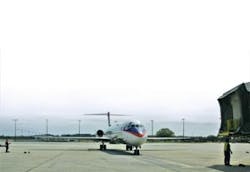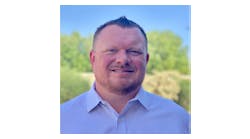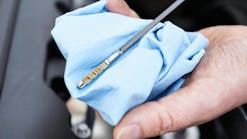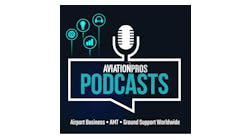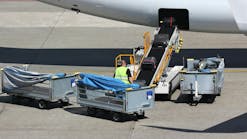Taking GAT Airline Ground Support from a local company to a thriving multi-state enterprise, Jean O. Raines didn't let obstacles like gender or lack of knowledge stop her. With determination and her positive attitude, she became skilled at doing business from the ground up.
"Our business is about partnerships - working together - networking," says Jean Raines, CEO of GAT Airline Ground Support, a ground handling company offering service to airlines in eight states. As primary owner since 1989, Raines views the company a little differently than her male counterparts might, referring to the ideas and successes of the employees while remaining modest about her own accomplishments in ground support as well as business.
Determination to succeed
GAT began in Alabama as an FBO called Mobile Air Center and was eventually sold, leaving only the fueling and maintenance services. Six months later, Raines' husband, a homebuilder and private pilot, died, leaving the company to her and personal friend James Baggett, an airframe and powerplant mechanic. He knew Baggett would be a great friend and loyal employee to Raines.
"That was in 1989," recalls Raines. "We had 53 employees at two locations. When I was at that first meeting with the airlines, I didn't know what they were talking about," she says. Delta, one of the first airline contracts for the company along with American Airlines, offered to step in and assist with the services, but she declined the offer. Instead Raines said, "I'm going to learn!"
Raines put her determination to the test, learning the ground support industry from the ground up. "I wanted to know everything there was," she laughs. Baggett recalls the time Raines wanted to know how to read inoperable fuel gauges, so they took a class and she came out tops. "She paid attention and asked questions and there were even A&Ps in the class listening to this," he says. "That's Jean, she always did well."
She learned to drive the tugs, belt loaders and other equipment, so no one could say she was doing it wrong. Studying the finances and working to understand the art of doing business, she made GAT's philosophy one of working with airlines, not for them, promoting people from within the organization and giving them the responsibility and freedom to become good managers.
Now, 16 years later, GAT employs more than 800 people at 17 airports in 16 cities. It's won three consecutive Safety Awards in Atlanta from Delta Airlines, Delta's Woman Owned Business of the Year 2004 and this year took home the Blue Print Award from Women Looking Ahead Inc.
Viewing gender as an asset
Does a female CEO change the dynamic of a company? For Raines, the answer is yes, although gender was not the obstacle one might expect in a male dominated industry. Instead, being a woman, in Raines' view, gave her an edge in the business world. People respond to her sincerity and trust that she cares about their business. "People pick up on my caring," she says. "They know you really want this to work. They mean a lot to you."
"I find females do better in a high role," adds Raines, "[better] than they do on the ramp." In these positions, females are more productive and the corporate world accepts them more easily than in physical jobs.
"They seem like they have a little bit more to prove when they're on the ramp," agrees Baggett.
For both Raines and Baggett, a superior female manager comes to mind, Robin Delahoussay. On the ramp, she was a good worker and enjoyed her job. It took them a long time to convince her they needed her as a trainer, but they finally did and she's been "terrific."
"We'd put her as a manager anywhere," says Raines, although Delahoussay is content to live in California and work at the second Orange County location at Santa Ana.
Currently, there are five female managers at GAT, Raines; Delahoussay; Diane Lensch, vice president; Dawn Middleton, human resources, financial oversight and planning and Val Gray, corporate communications (and photographer for this article).
Independence is the key to multiple location success
Raines runs GAT like one big family from one of the corporate offices in Mobile, AL. She keeps in contact with her station managers via computer saying, "without technology, we couldn't do it."
From Mobile she can find out what's happening at each station, but maintain a "hands-off" approach. "We let our managers run the business," says Raines, who encourages them to operate the station as though it were their own franchise. They have control over budget items, employee programs and incentives, growing the business through leads, working with local regulations, etc. And as GAT continues to do better, the station managers reap the rewards.
"We're confident in our managers," she says. "They're out there working as hard as they can."
Because partnerships are so important in business, Raines chooses station managers carefully, pairing up the personality of the manager with that of the customer. "We have a national pool of people," says Baggett. "We get our people from the ground up," he says, referring to GAT's commitment of promoting from within. Raines likes managers who are proactive with problems, contacting their airline partner if a situation arises or they are unable to fulfill a request. "Treat them the way you would want to be treated," she says to managers. Something else Raines encourages is enthusiasm, especially when it leads to new ideas and programs.
She mentions Carl Schouw, a station manger in Atlanta, who she says is the reason that station has won so many safety awards. He came up with the idea of paying ramp employees for the work they do, instead of just hourly. The work is still done safely and correctly as it needs to pass inspection, but the more the employees do, the more money they can make. "[We've noticed] it cuts down on turnover, which saves on training costs," adds Baggett.
GAT has a number of other successful safety initiatives, which are reflected in its outstanding safety record. The programs that work best are those that reward accomplishments, says GAT Director of Training/IT, Mark Doggett.
In some programs there are cash prizes for the days the station goes without an OJI (On the Job Injury) or other positive incentives for employees, but that's not GAT's real target. The management wants the employees to follow the safety procedures and polices. OJIs and accidents are actually consequences of not doing this, explains Doggett. The safety programs raise awareness, both of the prizes, but more importantly, the safety issues we have procedures and polices in place to prevent.
Raines believes these safety initiatives are a good investment because they encourage the employees to not only be safe, but lead to positive peer pressure where employees actually prevent fellow workers from taking shortcuts out on the ramp.
Getting the employees involved does a lot, it not only raises moral, increases productivity and reduces turnover, but gets the employees excited, which Raines likes to see. The list of potential mangers at GAT grows everyday and Raines encourages current mangers to train people to do their job, so they can move up. "That's the most important thing," she says.
Recent challenges
For Raines the toughest challenge has not been her gender, but the complexities in doing business post 9/11.
"The business changed," she says. The financial struggles of airlines have caused them to look for ways to save money and one way to do that is to outsource. "We are seeing more and more outsourcing from airlines that never did before," adds Doggett. Because of this, ground handlers are trying to keep up with demand, including offering more services where handlers deal directly with passengers. "That's huge for the airlines," says Doggett, "letting somone else do their customer service."
Everyone's had to maintain their level of service for less, with safety remaining a priority, says Raines, but with teamwork, we can all do it. It is exciting to see how everyone is cooperating.
Insurance has also been a challenge, explains Raines. Doggett agrees. The market is tighter, he explains. There are fewer grade "A" insurance companies, which mean premiums are higher. A few years ago insurance companies would look for you, but now its you looking for them. Basically, they want to see a company who is responsible.
Raines describes a collaborative effort GAT has begun with its insurance company, which includes GAT covering certain damages internally. "So far, we've come out ahead," admits Raines.
Expanding to the sea
The future might wait for GAT at the dock instead of on the ramp, as Raines talks about branching out GAT's services to cruise ships or other industries besides aviation. These new endeavors, Raines believes, will be similar to the current aviation ground handing, requiring staff to clean the compartments, transfer baggage, ensure security, etc.
In aviation, she sees an increase in the managing services airlines are asking for. "Our service is truly from the ground up. We do everything for the airlines now," she says. "It's cheaper for them to hire us as a business partner and have us manage [the operation]."
The success of GAT Airline Support Services is a prime example of what determination and a positive outlook can achieve. Raines was not intimidated by being a woman or starting from the ground, learning her way up. She says, "the bottom line is, we love aviation." With her encouragement, the GAT team continues to partner with more airlines and offer more services, leading to greater success.
